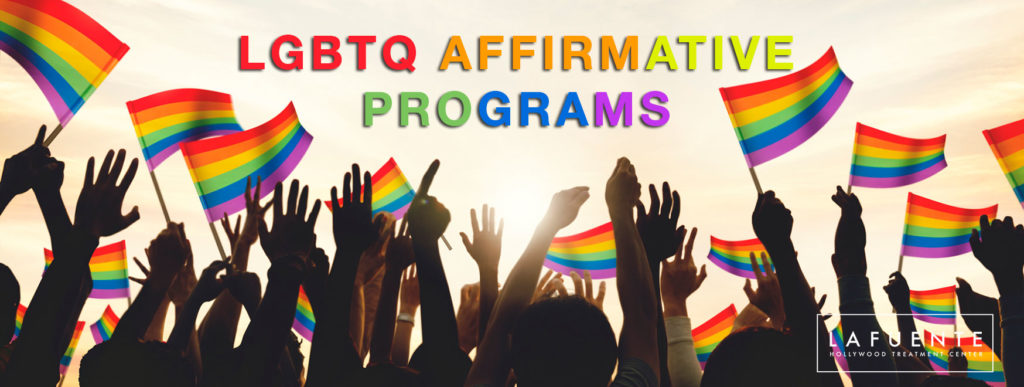We don’t mean to bash the competition, but when it comes to something as important as substance abuse treatment, why would LGBTQ people choose anything besides an LGBTQ-affirmative drug treatment?
Many drug treatment centers may claim to be LGBTQ-friendly, but it’s often unclear what that means exactly. For example, studies have found that almost 50% of substance abuse counselors have no formal training in LGBTQ issues and how they relate to substance abuse.
These challenges include trauma, discrimination, family problems, homophobia/transphobia, and harassment. They’re major contributors to the high rates of substance abuse in this community.
Without specialized care, LGBTQ people aren’t able to address these challenges. As a result, many in traditional rehab programs are stuck in a sobriety-relapse cycle.
But it doesn’t have to be like that. One study found that gay and bisexual men enrolled in specialized addiction treatment programs had better outcomes than those in non-specialized groups. By providing culturally competent care, LGBTQ people are able to get sober and stay sober.
Read on to learn 6 things LGBTQ-affirmative drug treatment centers offer that traditional centers don’t.
1. An Accepting Environment
At the very least, LGBTQ-affirmative drug treatment centers offer an accepting environment. This may seem like a given. Especially with LGBTQ people gaining more and more acceptance worldwide. However, many drug treatment centers show bias against LGBTQ people.
It’s unlikely that LGBTQ people will encounter outright hostility at a treatment center. However, some care providers may have implicit biases about this group. Staff members may say something or display body language that inadvertently communicates stereotypes or negative messages about LGBTQ people.
In many cases, these behaviors are nearly invisible. For that reason, they’re called microaggressions. While the name makes them sound minor, such actions and statements can determine whether a patient follows medical advice.
Examples of microaggressions include using incorrect gendered terms like “sir” or “ma’am” with transgender clients or questioning a client’s self-identified gender or sexuality.
2. Culturally-Competent Care
Clients should never have to educate healthcare providers about their sexual orientation or gender identity. That’s especially true when patients are in a situation as stressful as seeking substance abuse treatment. When patients make such a courageous step, treatment centers should do everything possible to alleviate unnecessary stress.
Providing culturally competent care is one way to take some of the burdens off of patients. There are many ways to provide culturally competent care when working with LGBTQ people. Here are just a few examples:
- Asking clients which pronouns they use and correctly using them throughout treatment.
- Providing all-gender bathrooms, showers, and dorms. If that’s not possible, allowing clients to use the facilities that align with their self-identified gender.
- Assisting transgender clients in administering hormones during treatment.

3. Support From LGBTQ Peers
When entering an LGBTQ-affirmative treatment center, new clients will be surrounded by other members of their community. This support is especially helpful when it comes to group therapy.
Instead of feeling like an outsider who has nothing in common with other group members, LGBTQ people will see their experiences and emotions validated. This makes them more involved and more motivated in the group and healing process.
4. Trauma-Informed Care
There’s a strong and well-documented link between trauma and addiction. Trauma means any situation in which a person:
- Fears for their safety
- Experiences intense pain
- Experiences a tragic or violent event
- Witnesses another person experiencing a violent event
Within the LGBTQ community, rates of trauma are 1.6 to 3.9 times greater than in the general population. The most common forms of trauma are bullying and harassment, sexual abuse, domestic abuse, and violence.
Trauma has a deep mental and emotional impact. As a result, people often self-medicate with drugs or alcohol. This is yet another explanation for the high rates of substance abuse in the LGBTQ population.
Given that most LGBTQ people have experienced some form of trauma in their lives, it’s vital for addiction treatment to address these issues. Trauma-informed care helps clients feel safe, work through their experiences, and gives them the skills to avoid further traumatization.
With their intimate knowledge of LGBTQ-specific traumas, affirmative treatment centers are best able to provide this type of care.
5. Dual-Diagnosis Treatment
In treating substance abuse, dual-diagnosis refers to treatment that addresses two or more co-occurring disorders. These disorders can be any number of different maladies. But for many LGBTQ people, it means dealing with addiction and a mental health condition like anxiety or depression.
Treating both conditions is essential in order to achieve the best treatment outcomes. In fact, treating one condition without addressing the other could actually make both conditions worse.
Given how common co-occurring disorders are in the LGBTQ community, affirmative programs are more likely to have the experience and the infrastructure required to treat them.
6. Additional Support Services
In addition to providing evidence-based treatments, LGBTQ-affirmative programs offer additional support services. For example, they may offer group sessions where clients can discuss issues like discrimination, coming out and identity. These programs may also offer holistic treatments, nutrition counseling, and smoking cessation programs.
La Fuente’s Commitment To LGBTQ-Affirmative Drug Treatment
La Fuente Hollywood Treatment Center is one of the only centers specializing in LGBTQ-affirmative substance abuse treatment. As members of the LGBTQ community ourselves, we feel it’s our duty to help LGBTQ people live productive, sober lives.
One of the cornerstones of our treatment is our non-judgmental, therapeutically sensitive approach. Our staff helps clients overcome the trauma, homophobia, and toxic shame underlying their addictions.
To that end, we’ve crafted our clinical program over time using evidenced-based treatment modules that include Motivational Interviewing, DBT, CBT, Family Systems, Mindfulness, Therapeutic Yoga, and Relapse Prevention Therapy.
Even though we’re confident in the services we offer, we understand that addiction treatment is a constantly evolving field. As such, we’re committed to providing the most up-to-date research and treatment approaches possible.
If you’re part of the LGBTQ community and are looking for addiction treatment designed with you in mind, contact us today.
Fill out the form below and a member of our staff will be in touch with you within 24 hours. They’ll be able to answer your questions and help you decide if our Los Angeles addiction treatment center is right for you.





